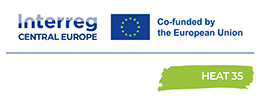Effective stakeholder engagement and mapping — involving municipalities, DHC operators, utilities, housing associations, and customers — are vital for coordination, clear communication, and shared commitment (see chapter 5 for further information). Therefore, these activities should be started as soon as possible, and, where appropriate, already in parallel with drawing up the transformation plans. Similar also the implementation of the quality management process (QM for DHC - based on QM for Biomass DH Plants; see D.2.2.1 for further information) should be started as early as possible - according to QM ideally “starting from the idea” for a project.
Transformation plans should remain adaptive and iterative, evolving with new data, technologies, and changing market or regulatory conditions.
Specific recommendations for DHC operators (according to TS5-Guidebook):
- Adopt an iterative, data-driven approach: Begin with a detailed baseline analysis, assess renewable energy potential, and apply scenario-based and backcasting methods; update plans regularly.
- Prioritize renewable integration and modernization: Incorporate local renewable sources such as geothermal, biomass, and industrial waste heat — while upgrading infrastructure and implementing digital tools for efficiency.
- Strengthen financial planning: Use comprehensive financial models with life-cycle and sensitivity analyses; diversify subsidies to ensure long-term economic viability and investor trust.

